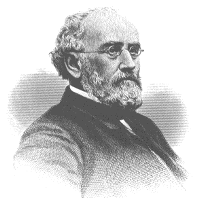|

|
Chapter 4: American Transcendentalism
George Ripley
1802-80
|
©
Paul P. Reuben
September 7, 2019
E-Mail
|
Page
Links: |
Nathaniel
Hawthorne and The Blithedale
Romance
|
Selected
Bibliography
|
MLA Style
Citation of this Web Page
|
| A
Brief Biography
|
Chapter Link: |
The
Utopian Movement
|
Site
Links: |
Chap 4: Index
|
Alphabetical
List
|
Table
Of Contents
| Home
Page
|

Source: GR:
Career as a Writer
George Ripley was a
Unitarian minister, Transcendentalist, member of the Transcendental
Club, and, with his wife Sophia Dana Ripley, cofounder of Brook
Farm. When conservative Unitarian Andrews Norton attacked the
Transcendentalists in his infamous Discourse on the Latest Form of
Infidelity in 1838, Ripley stood out as the most outspoken defender
of the transcendental gospel. His able arguments in this
printed skirmish solidified the Transcendentalist resistance against
conventional Unitarianism as well as utterly demolished Norton's
position. Ripley edited and published the 14-volume Specimens
of Foreign Standard Literature (1838&endash;1842) and served as
business manager for the Dial. His conscience spurred him to
resign his pulpit in March 1841. - Alcott
Net
Primary Works
Discourses
on the Philosophy of Religion, 1836; The Latest form of
Infidelity Examined, 1839.
Selected
Bibliography
Cooke, George W. John
Sullivan Dwight; Brook-Farmer, Editor, And Critic Of Music. A
Biography. NY: Da Capo P, 1969. ML423.D9 C7
Crowe, Charles R. George
Ripley, Transcendentalist and Utopian Socialist. Athens: U of
Georgia P, 1967. PS2713 .C7
Francis, Richard.
Transcendental Utopias: Individual and Community at Brook Farm,
Fruitlands, and Walden. Ithaca: Cornell UP, 1997.
Golemba, Henry L. George
Ripley. Boston: Twayne Publishers, 1977. PS2713 G6
McCallum, R. Ian.
"Alchemical Scrolls Associated with George Ripley." in Linden,
Stanton J. ed. Mystical Metal of Gold: Essays on Alchemy and
Renaissance Culture. NY: AMS, 2007.
Myerson, Joel. Brook
Farm: An Annotated Bibliography and Resources Guide. NY: Garland,
1978.
- - -. The Brook
Farm
Book: A Collection of First Hand Accounts of the Community. NY:
Garland, 1987.
Newman, Lance. Our
Common
Dwelling: Henry Thoreau, Transcendentalism, and the Class Politics of
Nature. NY: Palgrave Macmillan, 2005.
Sams, Henry W.
Autobiography of Brook Farm. Englewood Cliffs: Prentice-Hall,
1958. HX656.B8 S9
Swift, Lindsay. Brook
Farm, its Members, Scholars, and Visitors, 1961. HX656.B8
S9
| Top
| George Ripley (1802-80): A Brief
Biography
A Student
Project by DeeAnn Hammond
George Ripley's
exact date
of birth is unknown, but what is known is the impact he made on the
Transcendentalist
movement in the 1840's. George and his wife Sophia are credited with
being the chief promoters of Brook Farm which was a utopian
experiment begun in 1841. (Brook Farm 130)
George Ripley was a
native
of Greenfield, Massachusetts and a graduate of Harvard College and
Harvard Divinity school. During the 1830's he and his Boston Brahmin
wife, Sophia were involved in the exciting cultural life of Boston
and Concord. (Lit. Bio.) In March of 1841 he gave his farewell speech
to his parish, and he and Sophia traded in their social circles for
the utopian life of Brook Farm, in search of the ideal society. They
were to become the pioneers in the most noteworthy effort in American
civilization at establishing a model community of workers, teachers
and students, living the Transcendentalist dream. (Brook Farm
introduction) Brook Farmers wished to abolish both poverty and wealth
and bridge the gap between the social classes. (Lit. Bio.)
Brook Farm housed
many
literary geniuses, among them Nathaniel
Hawthorne,
Margaret
Fuller, and
Amos
Bronson Alcott
to
name a few. It is said that over two hundred individuals had been
connected with Brook Farm from first to last. (Brook Farm 118) Shares
of the farming work were expected from everyone at Brook Farm except
the very young and George and Sophia went about their new lifestyle
with much enthusiasm. George threw himself into humble tasks and was
in constant good cheer, seeming to enjoy himself.
Regardless of the
hard work
being done at Brook Farm, monetarily it began to fail. The land had
been ill suited for farming and lack of financial means led to its
painful demise in the fall of 1847.The property was transferred to a
board of trustees and the Ripleys moved to Flatbush, Long Island.
George continued to write for the Harbinger, the literary
publication of Brook Farm until it ceased to be. He was then offered
employment with the Tribune and for a while times were hard
for George and Sophia who was now teaching school.
Sophia fell ill with
cancer,
and after a long and painful illness, sucumbed to the disease in
1861. Sophia's work had been so much a part of her husband's, and he
credited her with being loyal and supportive. She was gifted in mind
and brilliant in conversation, tall and fair and her power to infuse
life into those around her must have been extraordinary. (Brook Farm
140)
After Sophia's
death, George
moved to Brooklyn where he eventually remarried. He began a secondary
but significant journalistic career, becoming well known for his
essays, reviews and articles in the New York Tribune. He
survived and triumphed, becoming a leader in scholarly journalism in
America. He was known as a journalist with high intellectual
standards. George Ripley died in New York City in 1880, a greatly
respected man. (Lit. Bio.)
Works Cited
Myerson, Joel. Dictionary
of Literary Biography- vol. 1, The American Renaissance in New
England Detroit Michigan, 1978
Swift,Lindsay. Brook
Farm Citadel Press, New Jersey, 1961(intro through 143)
MLA
Style
Citation of this Web Page:
Reuben,
Paul P. "Chapter 4: George Ripley and Brook Farm." PAL:
Perspectives in American Literature- A Research and Reference Guide.
WWW URL: http://www.paulreuben.website/pal/chap4/ripley.html (provide
page date or date of your login).
| Top |

